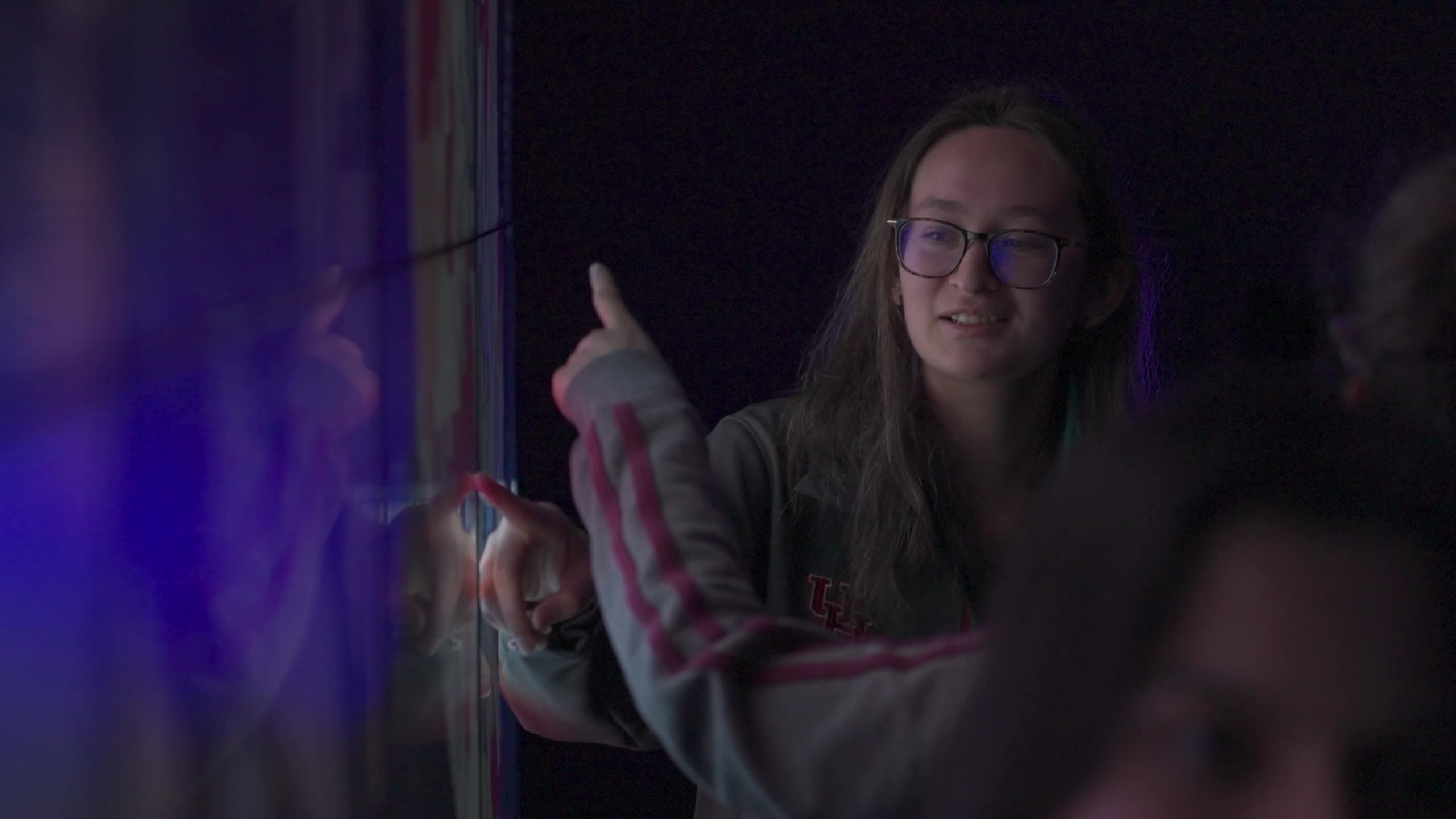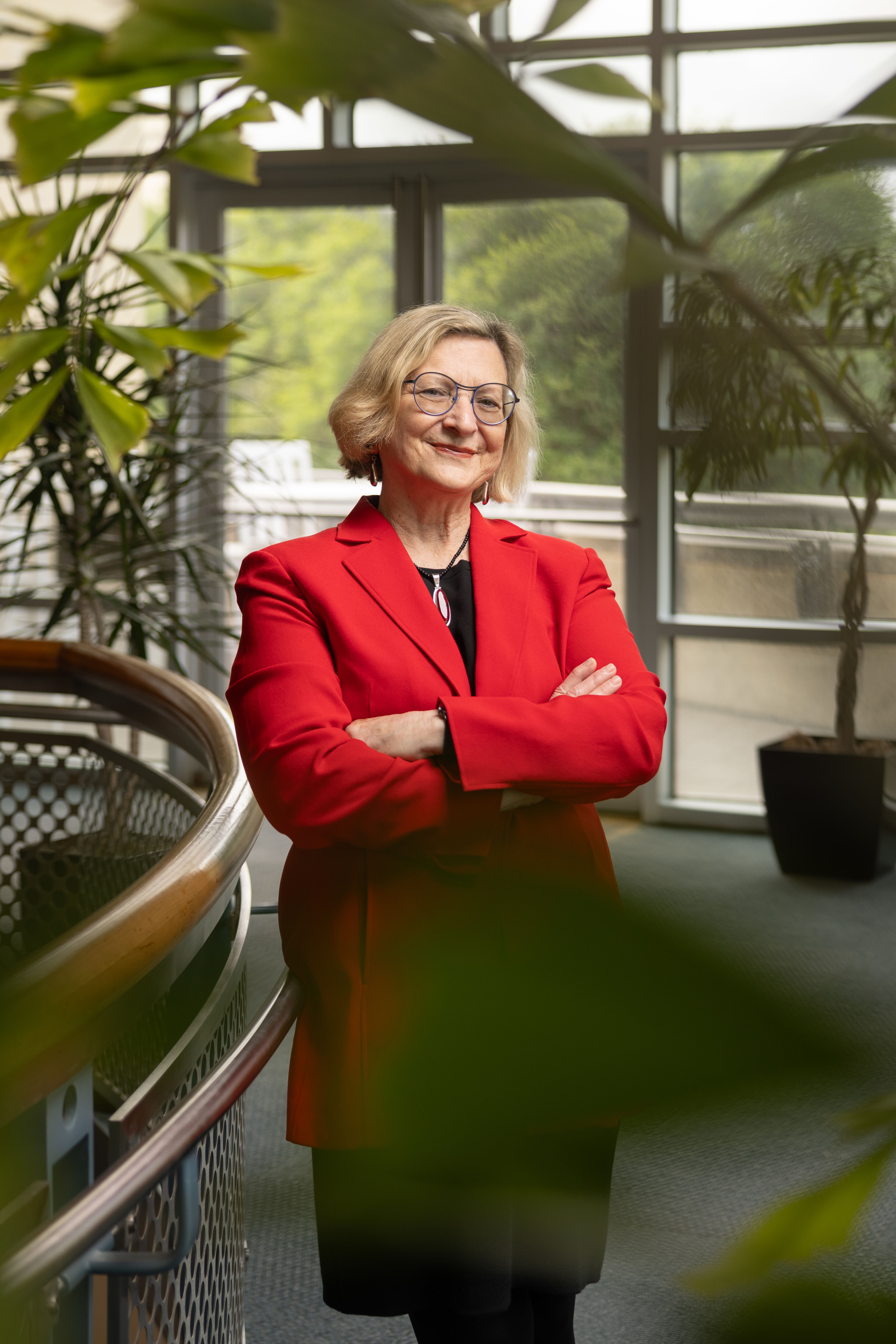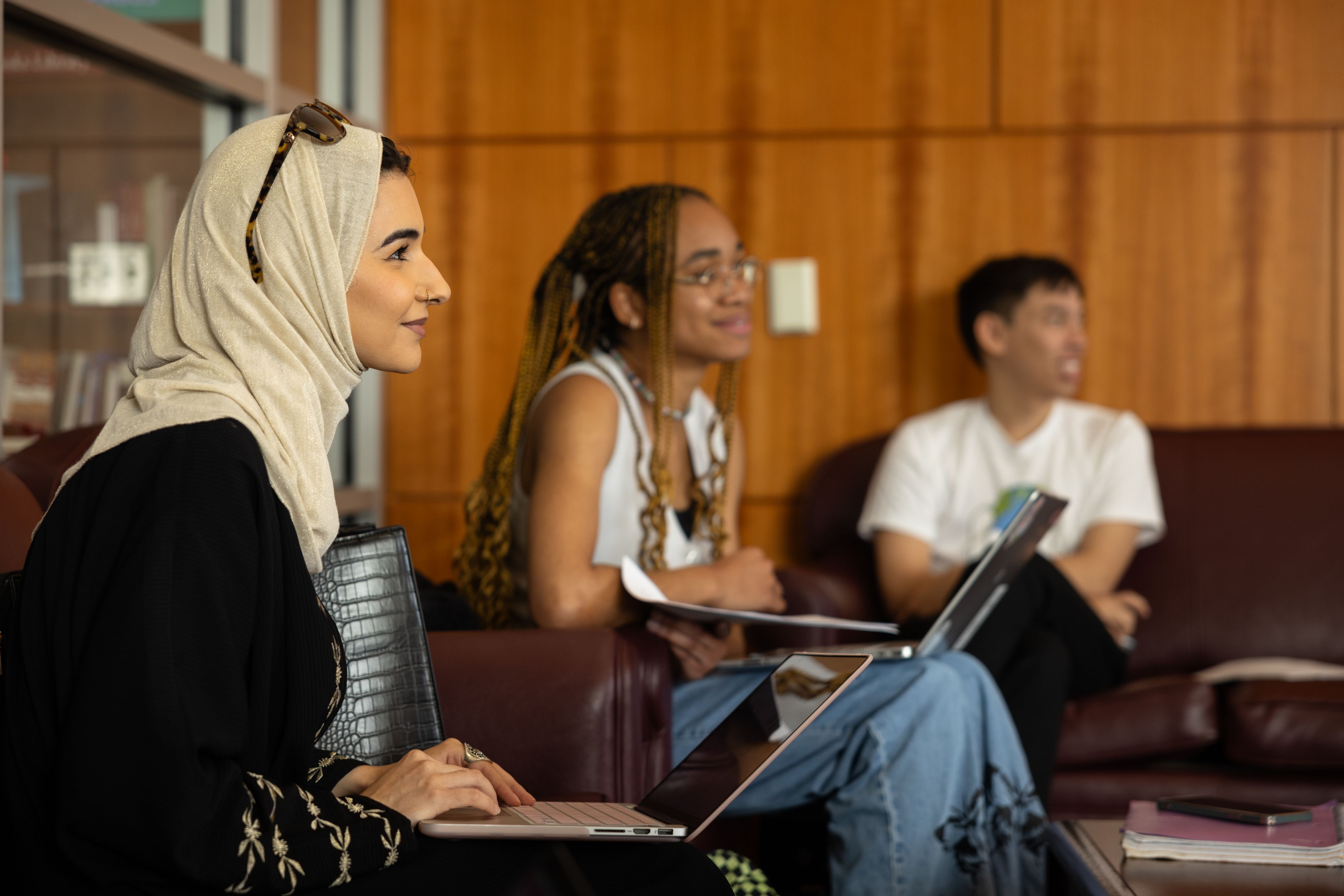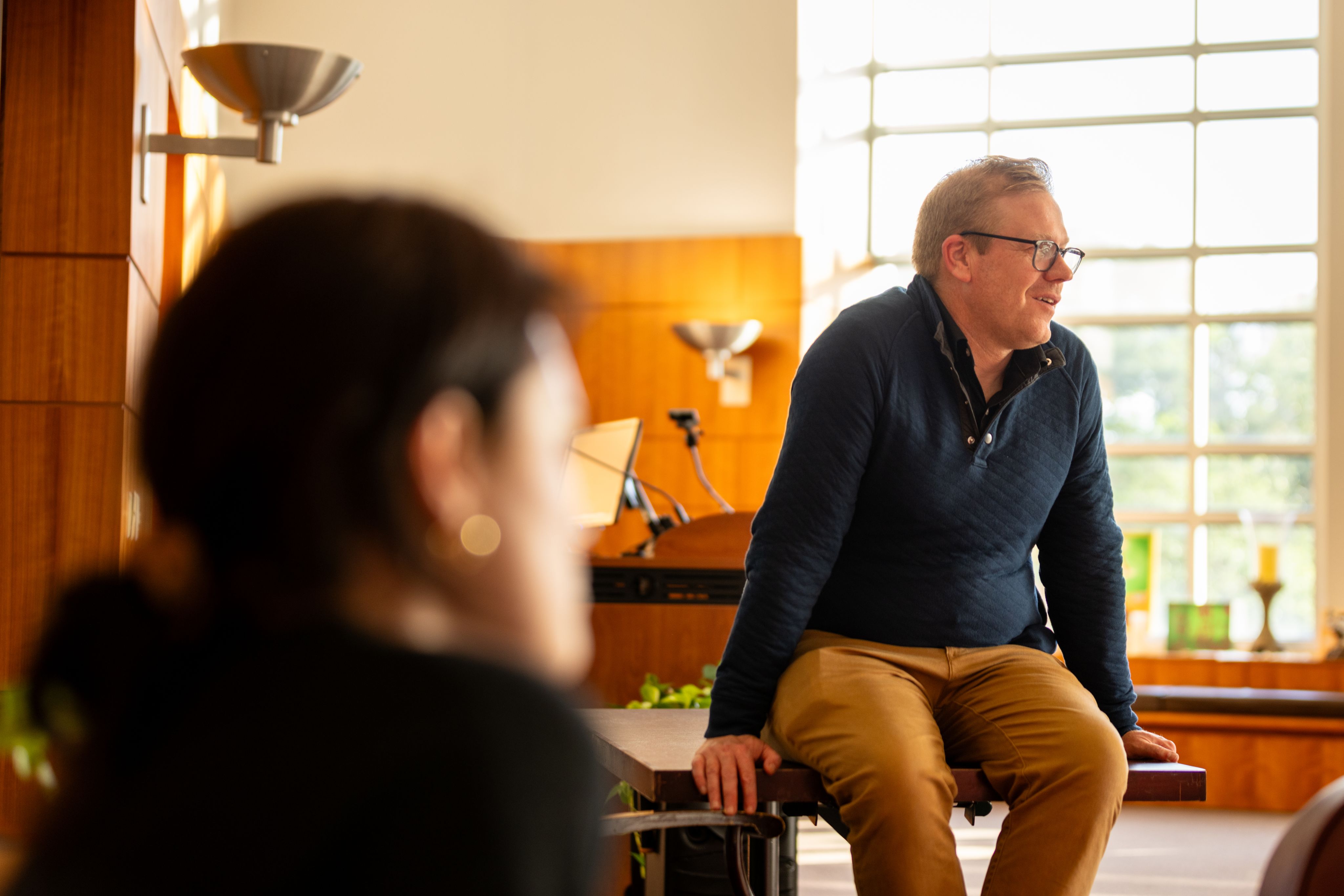An Academic ‘Vanguard’ for Houston — and the World
The UH Honors College has found a way to enact a rigorous, humanist curriculum while remaining uniquely inclusive.

Recently, Dean Heidi Appel went back to class.
The revered plant biologist and academic leader began her tenure as dean of the University of Houston Honors College on July 1, 2023, and as part of her self-described “listening tour,” she began attending the college’s Human Situation course.
Taking a seat in one of the college’s most popular courses was a logical first step. After all, the course — which takes a “Great Books” approach — was one of the things that first attracted her to UH in the first place.
While she laughs and says she didn’t read all the assigned books, she goes on to share that what she finds impressive about the Human Situation course is how engineering students debate Plato with English majors, and chemistry majors can engage political science students in robust discussions about ethics and political theory.
“In addition to the rigorous ‘Great Books’ approach and interdisciplinary minors, one of the reasons I came to UH was how inclusive we are,” Appel says. “This is the only honors institution in the country that has all these minors and programs open to everyone, and I think that’s pretty important.”

Portrait of Honors College Dean Heidi Appel in MD Anderson Library at the University of Houston.
Portrait of Honors College Dean Heidi Appel in MD Anderson Library at the University of Houston.
The Honors College, which began as a program in 1957, is now a fully-fledged college with over 25 faculty and more than 2,400 students. Further, any UH student can minor in any of the Honors College’s six interdisciplinary minors — an opportunity that many students capitalize on. Appel says, depending on the program, a given minors’ non-honors total student population may range from seven to 30 percent. Meanwhile, the college hosts speech and debate teams, undergraduate research and major awards programs, which are open to the entire university.
This distinctive blend of inclusivity and academic rigor has made the Honors College what Appel calls a “vanguard” in academia. At a time when rapidly evolving technology is shaping our world, UH’s interdisciplinary approach is producing graduates uniquely equipped to tackle the world’s most urgent challenges. This vital work is only possible when you provide more opportunities, rather than fewer, to students of every kind.
Take, for example, the Creative Work minor led by author and lecturer Robert Cremins.
“We think of our students — and encourage them to think of themselves — as ‘creative citizens,’’’ Cremins says. “In the foundation course of the minor ‘Creativity at Work,’ they get to write a manifesto in which they envision at least one project they aspire to complete in or for their world. It's an exploration of the deep potential of their discipline or vocation. Also, it seeks to answer the question, ‘What needs to be done to achieve this ideal outcome?’”
Cremins’ program, and the college’s five other minors, are constantly evolving in response to the needs of students, the Houston community and the world beyond.

Recently, Max Rayneard, the associate director of Creative Work, introduced a foundation course called “Creativity at Work.” At its core, the class is about leveraging different forms of creativity from different disciplines. The course culminates in a project called “Our Houston,” which is shaped by what Rayneard calls “a deceptively simple prompt.”
“Together, describe your Houston.”
“‘Our Houston’ combines community-based research and community-engaged creative praxes,” Rayneard explains. “It asks students to think carefully about the communities to which they belong, how they would like to do those communities justice in the presentation, and to do so in collaboration with representatives of other Houston communities. How do these communities overlap? How do they differ? Through what creative forms of expression can they support each other in giving the diversity and complexity of their Houston voice?”

Dr. Max Rayneard, associate director for the Creative Work minor at the Honors College, engages with a cohort of students participating in the FrameWorks Program which elevates undergraduate critical inquiry in the interdisciplinary humanities through mentorship and peer-support.
Dr. Max Rayneard, associate director for the Creative Work minor at the Honors College, engages with a cohort of students participating in the FrameWorks Program which elevates undergraduate critical inquiry in the interdisciplinary humanities through mentorship and peer-support.
This is just one example of the college’s interdisciplinary approach. And because this approach is truly inclusive — both in terms of the students in the classrooms and the pedagogies at work — Appel is confident Honors College graduates are precisely the kind of professionals our world needs most.
“Whether it’s AI or risks in the design of genes, these are issues our society has to face from a humanist perspective,” Appel says. “That’s the perspective we’re creating.’
When she talks about the college she leads, Appel exhibits the same passion you might find in a curious scholar discovering that the whole academic world is their oyster. She rattles off stories about her college’s professors, and she cites studies from the National Science Foundation and the National Academy of Sciences that highlight the importance of the humanities in a technological world that moves at breakneck speed.
In other words, Dean Appel is the perfect person to lead the Honors College — and she’s not the only one uniquely suited to the academic culture in place at UH.
Brenda Rhoden, the University’s assistant dean of academic success, is also the director of the college’s leadership studies minor. As such, she is highly experienced in helping develop young leaders who go on to build admirable careers in a myriad of fields.
Elsewhere in the college, a new minor, Data and Society, has become wildly popular among students despite being a recent addition to the college. Its popularity extends beyond campus, too. Program leader Dan Price inked a deal with the Environmental Protection Agency that involved students working alongside the EPA to analyze, understand and wield data for different environmental justice projects.

“We were surprised at how quickly it took off last year, like everyone else, but we'd been expecting something like this since we first envisioned the minor,” Price says. “We think it's a real paradigm shift in how we understand what it means to do work, and that the winners of the new economy will be the people who know how to ask the right questions and can make the new tools work for them.”
Appel is proud of these program leaders and the work they’re doing. And soon, she’ll join them.
Her listening tour is now complete; and in the fall, the dean will step back into the classroom — this time as a teacher. She and Cremins will teach a Creative Work course that leverages their respective experiences with creativity in science and creativity in literature.
“Our STEM students need arts and humanities, and vice versa,” Appel says. “That’s how we can work together to solve some of the biggest problems we face.”
Six Pillars of UH Wisdom: The Unique Minors of the Honors College
The number six is rather remarkable when we pause to consider the gossamer symmetry of the six-sided snowflake and how a simple honeycomb’s six sides can create beautiful and stable structures. God creating the heavens and the earth, and all that lay between, in six days is a central tenet in religious texts for Christians, Jews and Muslims. In pop culture, there is said to be six degrees of separation between anyone and Kevin Bacon.
Six also happens to be the number of minors designated for the Honors College. Coincidence? These thought-provoking minors show the symmetry and depth of knowledge explored by students and faculty in the Honors College.
Click on each minor to learn more.
This content was paid for and created by The University of Houston. The editorial staff of The Chronicle had no role in its preparation. Find out more about paid content.



